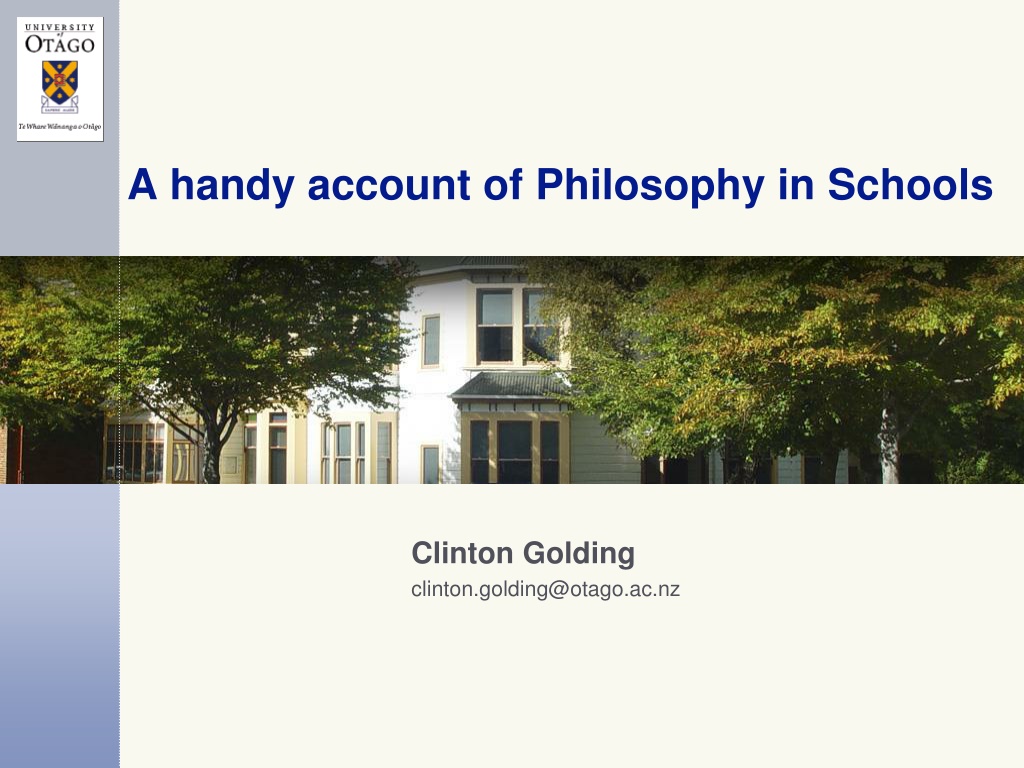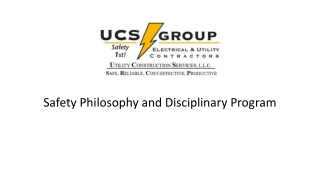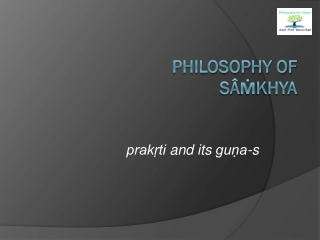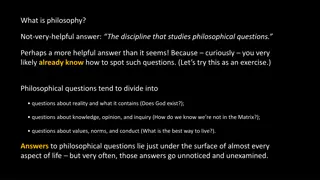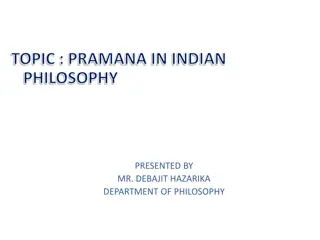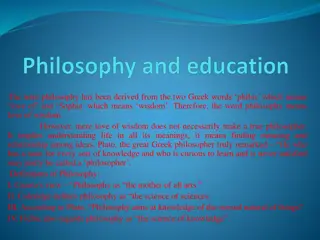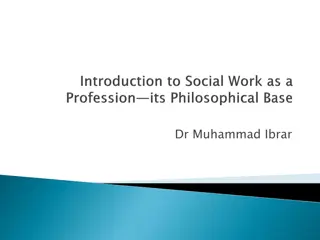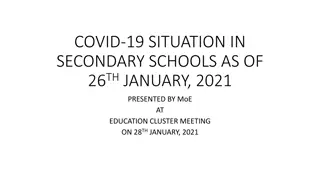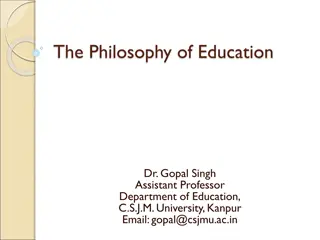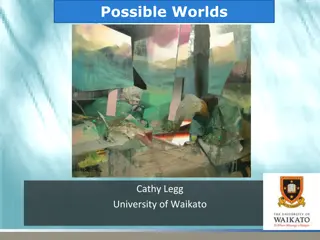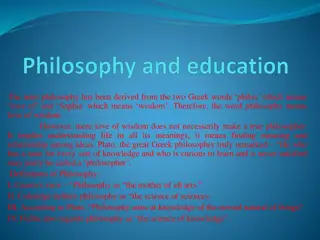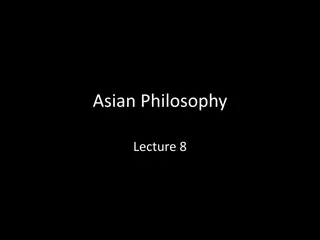Exploring Philosophy in Schools: A Comprehensive Overview
Delve into the educational and philosophical aims of teaching Philosophy in schools, understanding the inquiry process, weaving networks of ideas, and tackling philosophical incongruence and inadequacy through reflective judgments. Explore how philosophical problems arise when ideas don't align and ponder over complex ethical dilemmas.
Uploaded on Sep 10, 2024 | 0 Views
Download Presentation

Please find below an Image/Link to download the presentation.
The content on the website is provided AS IS for your information and personal use only. It may not be sold, licensed, or shared on other websites without obtaining consent from the author. Download presentation by click this link. If you encounter any issues during the download, it is possible that the publisher has removed the file from their server.
E N D
Presentation Transcript
A handy account of Philosophy in Schools Clinton Golding clinton.golding@otago.ac.nz
The aim of the account Notice and avoid common problems in teaching Philosophy in Schools Understand the educational and philosophical aims Discern the essential method that can be applied in various situations Distinguish from similar practices
Educational aim Making sense Subject matter Philosophical problems Thinking process this should all be in white so it does not show up Inquiry: Questioning, suggesting, elaborating, evaluating, reflecting Educational Culture Community of Inquiry Guiding the inquiry as an expedition-educator Teacher s role
Educational aim: Making sense Weaving a network or framework of ideas, connections, inferences and relationships More than knowing, understanding or being able to explain and apply the facts and answers
Making sense is the epistemic aim Making sense All answers are equally good Right and wrong answers Better and worse answers Mere opinions Absolute, final, certain Reasoned, reflective judgements
Subject matter: Philosophical problems Philosophical problems occur when our ideas do not hang together. They arise when we try to make sense of the world, but find our conceptions remain incongruent or inadequate even after we have gathered all the information and knowledge.
Philosophical incongruence A friend says it is OK to keep something you find, but you think it is stealing. The two views are incompatible, so you wonder: What does count as stealing? You are puzzled by why it is OK to eat chickens but wrong to eat cats. It seems inconsistent to eat one but not the other
Philosophical inadequacy You wonder: if all the clocks were destroyed, would there still be time? Your conception of time is superficial and undeveloped You know it is wrong to hurt other people, but you are puzzled by why this is. You have an inadequate concept of what makes something wrong
Resolving philosophical problems Create a new way to see and act not by experiment, gathering data, facts or information. e.g. Resolve the philosophical incongruence between eating cats and chickens by distinguishing between livestock which are OK to eat (chickens), and pets which are not OK to eat (cats). The incongruence disappears when we see things in this new way We do not add new knowledge
leads to new problems We now have to resolve the inadequacy about why it might be justified to eat livestock but not pets A better resolution would also resolve this problem.
Philosophical questions about rich concepts Tools to articulate philosophical problems
Rich concepts Health, evidence, honesty, intelligence Building blocks of meaning Contestable For example, we think that being free is good, but we sometimes feel happier when we are told what to do. Our concept of freedom is incongruous.
Philosophical questions about rich concepts Should freedom always be the most important value? Is happiness more important than freedom? What is freedom? Why is freedom important in our lives? How do we know when we are free? Are we ever truly free?
Philosophical questions Can t be answered by gathering information Better and worse answers not right and wrong Better answer provides a better resolution of the underlying problem We cannot judge the better answers by: conducting a survey reading a book doing a calculation consulting an expert
Thinking process: Inquiry Process of inquiry away from the problem that stimulates the inquiry, and towards a resolution of this problem See handout page 1 and 2
Thinking process: Inquiry 1. Experience stimulus 2. Articulate a problem 3. Suggest 4. Elaborate, explore and analyse 5. Test and evaluate 6. Resolve 7. New problem Reflect (at any time)
Thinking process: Inquiry See handout page 1 and 2
Educational culture: The Community of Inquiry Collaborative inquiry Not intellectual sparring or sharing opinions Community chosen problems & questions Distributed thinking
Inquiry learning Learning the content of philosophy by inquiring about it Learn to inquire by internalising the collaborative inquiry
We made progress Wemove from our shared problem through a process of shared inquiry and towards a resolution of the problem. Advancing our distributed inquiry through each stage of the inquiry process
Continuum of kinds of discussion Free and undirected Teacher- directed Community of Inquiry Abandoned and no path Teacher-imposed path Teacher and students choose path Interdependent conversation Dependent inquiry Interdependent co- inquiry Engaged with students Engaged with teacher Engaged with student inquiry
Continuum of kinds of discussion See handout page 3
Guiding inquiry Journey of inquiry Tour-leader Expedition-guide Expedition-leader Expedition-educator
Tour-Leader Path mapped out in advance milestones and sometimes answers decided before the inquiry Students must consider this argument, they must ask this question, etc. See teacher-directed discussion
Expedition-Guide Genuine inquiry Path emerges rather than pre-determined Have to consider what we have done so far to figure out what to do next Even if the teacher knows the area they treat the inquiry as a genuine inquiry Allow themselves to be on an expedition with their students, blazing new trails and following new paths
Two kinds of expedition guide Expedition-leader Expedition-educator Outcome-leading Inquiry-educating Decides path for students Co-decides path with students Tell students what to do Enable students to judge what to do Offering students a choice about the path Advancing co-created agenda Directing students Advancing teacher s agenda How can I lead students to the correct judgments, the judgements I think they should make? How can I help students to make progress in their inquiry, and so learn to guide themselves?
Outcome leading approach Lead students to teacher-decided good milestones, and away from bad milestones Is that correct? (meaning: Is that the response they should have made? ) Students do not engage in genuine inquiry and do not learn to inquire for themselves. Teacher-directed discussion What is the next important outcome to be reached in the inquiry? How do I ensure that my students reach this outcome?
Inquiry educating/encouraging approach What should students do to make progress? Which thinking will advance the inquiry, and how can we enable students to do this thinking? Don t consider whether they have the right milestones or outcomes Vary guidance based on student expertise What will help my students make progress in thisinquiry and so learn to guide themselves? Only provide guidance to help students learn to inquire Community of Inquiry
